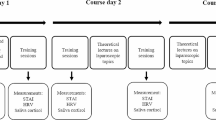Abstract
Background
Minimally invasive surgery causes higher mental strain for surgeons than conventional surgery and is significantly more stressful in consecutive cases. This study aimed to investigate whether individual stress responses are associated with intraoperative alterations of manual surgical skills and technical errors of the laparoscopic surgeon.
Methods
The LapSim virtual reality simulator was used. Stress measurement was carried out for 18 surgeons performing a virtual cholecystectomy using the LapSim simulator in the context of the patient simulator provided by the METI Corporation. In the course of the study, the surgeons were exposed to different external stressors (S1–S4) in defined intervals. The activity of the sympathetic nervous system was evaluated by skin resistance with the help of a sympathicograph.
Results
Three different surgeon-specific stress reactions (SSR) could be identified. The first, SSR-1, with significant stress reactions during the study without recovery, showed larger laparoscopic extensions of movement but fewer intraoperative complications than SSR-2 (recovery after the stress reactions) or SSR-3 (without significant stress reactions).
Conclusions
The mental load of the laparoscopic surgeon might be highly optimized by continuous activity of the sympathetic nervous system. The question of what extent or quality of stress produces adverse effects remains unclear.



Similar content being viewed by others
References
Berguer R, Smith WD, Chung YH (2001) Performing laparoscopic surgery is significantly more stressful for the surgeon than open surgery. Surg Endosc 15:1204–1207
Bohm B, Rotting N, Schwenk W, Grebe S, Mansmann U (2001) A prospective randomized trial on heart rate variability of the surgical team during laparoscopic and conventional sigmoid resection. Arch Surg 136:305–310
Czyzewska E, Kiczka K, Czarnecki A, Pokinko P (1983) The surgeon’s mental load during decision making at various stages of operations. Eur J Appl Physiol 51:441–446
Eastridge BJ, Hamilton EC, O’Keefe GE, Rege RV, Valentine RJ, Jones DJ, Tesfay S, Thal ER (2003) Effect of sleep deprivation on the performance of simulated laparoscopic surgical skills. Am J Surg 186:169–174
Hassan I, Weyers P, Maschuw K, Dick B, Gerdes B, Rothmund M, Zielke A (2006) Negative stress-coping strategies among novices in surgery correlate with poor virtual laparoscopic performance. Br J Surg 93:1554–1559
Janitzki A, Götte A (1986) Hautwiderstandsmessungen zum Aktivitätsnachweis des Sympathicus bei der Spinalanästhesie. Regional-Anästhesie 9:49–53
Jensen A, Milner R, Fisher C, Gaughan J, Rolandelli R, Grewal H (2004) Short-term sleep deficits do not adversely affect acquisition of laparoscopic skills in a laboratory setting. Surg Endosc 18:948–953
McCraty R, Atkinson M, Tiller WA, Rein G, Watkins AD (1995) The effects of emotions on short-term power spectrum analysis of heart rate variability. Am J Cardiol 76:1089–1093
Moorthy K, Munz Y, Dosis A, Bann S, Darzi A (2003) The effect of stress-inducing conditions on the performance of a laparoscopic task. Surg Endosc 17:1481–1484
Moorthy K, Munz Y, Forrest D, Pandey V, Undre S, Vincent C, Darzi A (2006) Surgical crisis management skills training and assessment: a simulation-based approach to enhancing operating room performance. Ann Surg 244:139–147
Muller M (2004) Safety lessons taken from the airlines. Br J Surg 91:393–394
Pagani M, Furlan R, Pizzinelli P, Crivellaro W, Cerutti S, Malliani A (1989) Spectral analysis of R-R and arterial pressure variabilities to assess sympatho-vagal interactions during mental stress in humans. Hypertension 7:14–15
Wetzel CM, Kneebone RL, Woloshynowych M, Nestel D, Moorthy K, Kidd J, Darzi A (2006) The effects of stress on surgical performance. Am J Surg 191:5–10
Woodrum DT, Andreatta PB, Yellamanchilli RK, Feryus L, Gauger PG, Minter RM (2006) Construct validity of the LapSim laparoscopic surgical simulator. Am J Surg 191:28–32
Yule S (2005) Critical thinking: nontechnical skills in surgery. Surgeon’s News 3:75–76
Author information
Authors and Affiliations
Corresponding author
Rights and permissions
About this article
Cite this article
Schuetz, M., Gockel, I., Beardi, J. et al. Three different types of surgeon-specific stress reactions identified by laparoscopic simulation in a virtual scenario. Surg Endosc 22, 1263–1267 (2008). https://doi.org/10.1007/s00464-007-9605-1
Received:
Revised:
Accepted:
Published:
Issue Date:
DOI: https://doi.org/10.1007/s00464-007-9605-1




